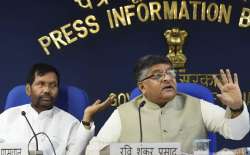Govt not committing cardinal sin by seeking reconsideration of collegium recommendations: Prasad
Minister Ravi Shankar Prasad said today amid charges by the opposition that the government was stalling appointments to the higher judiciary

The executive was not committing a "cardinal sin" by seeking reconsideration of some proposals made by the Supreme Court collegium on the appointment of judges, Law Minister Ravi Shankar Prasad said today amid charges by the opposition that the government was stalling appointments to the higher judiciary.
He also said that the judiciary had enough "foresight and statesmanship" to settle differences within it and urged the political class to remain "immune" from the issue.
The Law Minister also made a veiled attack on the Congress, claiming that parties which had lost in elections were using courts to hit out at the ruling party through "sponsored litigation".
Referring to allegations that the government was stalling appointments to the Supreme Court and the 24 high courts, Prasad said neither the law minister nor the law ministry was a "post office" which would only process recommendations of the collegium on the appointment of judges.
The government had come under attack when it returned to the collegium its recommendation to elevate Uttarakhand High Court Chief Justice K M Joseph to the Supreme Court, citing seniority and regional imbalance.
He said the government respected the verdict of the Supreme Court to quash the National Judicial Appointments Commission Act which sought to give the executive a larger say in judicial appointments.
"But I wish to make it very clear that the law minister or the law ministry is not a post office. This fact I would like to very gently highlight. Even in the collegium system...created by the three judgments of 1993, 1998 and 1999, the right of the government has been acknowledged to seek a reconsideration and also to give inputs," he said addressing an event.
He said reports that by seeking a reconsideration, "we are committing a cardinal sin" is not correct.
"We have a constitutional role...we shall continue to respectfully and gently convey our views. Obviously, the collegium has to take a call," Prasad said.
Referring to appointments in the high courts, he said the years 2014 and 2015 were "lost" in the "NJAC battle" when appointments were stalled due to a lack of procedure.
Through NJAC, the government had sought to overturn the over two decade-old collegium system of judges appointing judges.
"In 2016, we appointed 126 HC judges, which was the highest number in the last 30 years. Since 1989, an average, 79 to 82 judges were appointed (per annum)," he said.
Prasad said, in 2017, 117 HC judges were appointed and till now 30 HC judges have been appointed. He said 30 additional judges were also made.
"And the things which are being processed, I am pretty sure, that the highest number of 126 appointments will be surpassed when 2018 ends," he said, adding that appointments were being fast-tracked.
He also said that the government's commitment for a robust judiciary is "complete and total".
In an opaque reference to the differences between the chief justice of India and four senior-most judges of the top court which came out in the open earlier this year, he said, "If there are differences in the judicial system, let us trust the foresight and statesmanship of the judiciary to settle it."
"I am pretty sure, that there is enough foresight and statesmanship among the judiciary to settle the issue of differences, if any. I would urge the political process to remain as immune from this process as possible. Judges will come, judges will go, but the institution of judiciary has to remain. And we must respect their institutional integrity," he said.
Without naming it, he also hit out at the Congress for allegedly using courts to settle political scores.
"I would urge the political processes, political parties that we have enough space to settle our differences in the popular franchise. But those who have lost popular franchise should not make courts the centre of their political design through sponsored litigation. That will be a sad day for the country," he said.
He had used similar expressions while attacking the Congress in the past over the case related to the death of judge B H Loya.
In April, Prasad had accused the Congress of running the country through courts based on "half-baked, false and sponsored litigations". He had then alleged that the Congress used the death of Loya as a political tool to settle scores with the BJP.